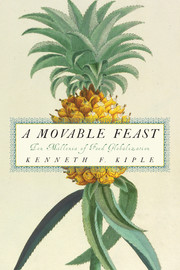Book contents
- Frontmatter
- Contents
- Preface
- Acknowledgments
- INTRODUCTION: FROM FORAGING TO FARMING
- Ch. 1 LAST HUNTERS, FIRST FARMERS
- Ch. 2 BUILDING THE BARNYARD
- Ch. 3 PROMISCUOUS PLANTS OF THE NORTHERN FERTILE CRESCENT
- Ch. 4 PERIPATETIC PLANTS OF EASTERN ASIA
- Ch. 5 FECUND FRINGES OF THE NORTHERN FERTILE CRESCENT
- Ch. 6 CONSEQUENCES OF THE NEOLITHIC
- Ch. 7 ENTERPRISE AND EMPIRES
- Ch. 8 FAITH AND FOODSTUFFS
- Ch. 9 EMPIRES IN THE RUBBLE OF ROME
- Ch. 10 MEDIEVAL PROGRESS AND POVERTY
- Ch. 11 SPAIN'S NEW WORLD, THE NORTHERN HEMISPHERE
- Ch. 12 NEW WORLD, NEW FOODS
- Ch. 13 NEW FOODS IN THE SOUTHERN NEW WORLD
- Ch. 14 THE COLUMBIAN EXCHANGE AND THE OLD WORLDS
- Ch. 15 THE COLUMBIAN EXCHANGE AND NEW WORLDS
- Ch. 16 SUGAR AND NEW BEVERAGES
- Ch. 17 KITCHEN HISPANIZATION
- Ch. 18 PRODUCING PLENTY IN PARADISE
- Ch. 19 THE FRONTIERS OF FOREIGN FOODS
- Ch. 20 CAPITALISM, COLONIALISM, AND CUISINE
- Ch. 21 HOMEMADE FOOD HOMOGENEITY
- Ch. 22 NOTIONS OF NUTRIENTS AND NUTRIMENTS
- Ch. 23 THE PERILS OF PLENTY
- Ch. 24 THE GLOBALIZATION OF PLENTY
- Ch. 25 FAST FOOD, A HYMN TO CELLULITE
- Ch. 26 PARLOUS PLENTY INTO THE TWENTY-FIRST CENTURY
- Ch. 27 PEOPLE AND PLENTY IN THE TWENTY-FIRST CENTURY
- Notes
- Index
Ch. 6 - CONSEQUENCES OF THE NEOLITHIC
Published online by Cambridge University Press: 22 August 2009
- Frontmatter
- Contents
- Preface
- Acknowledgments
- INTRODUCTION: FROM FORAGING TO FARMING
- Ch. 1 LAST HUNTERS, FIRST FARMERS
- Ch. 2 BUILDING THE BARNYARD
- Ch. 3 PROMISCUOUS PLANTS OF THE NORTHERN FERTILE CRESCENT
- Ch. 4 PERIPATETIC PLANTS OF EASTERN ASIA
- Ch. 5 FECUND FRINGES OF THE NORTHERN FERTILE CRESCENT
- Ch. 6 CONSEQUENCES OF THE NEOLITHIC
- Ch. 7 ENTERPRISE AND EMPIRES
- Ch. 8 FAITH AND FOODSTUFFS
- Ch. 9 EMPIRES IN THE RUBBLE OF ROME
- Ch. 10 MEDIEVAL PROGRESS AND POVERTY
- Ch. 11 SPAIN'S NEW WORLD, THE NORTHERN HEMISPHERE
- Ch. 12 NEW WORLD, NEW FOODS
- Ch. 13 NEW FOODS IN THE SOUTHERN NEW WORLD
- Ch. 14 THE COLUMBIAN EXCHANGE AND THE OLD WORLDS
- Ch. 15 THE COLUMBIAN EXCHANGE AND NEW WORLDS
- Ch. 16 SUGAR AND NEW BEVERAGES
- Ch. 17 KITCHEN HISPANIZATION
- Ch. 18 PRODUCING PLENTY IN PARADISE
- Ch. 19 THE FRONTIERS OF FOREIGN FOODS
- Ch. 20 CAPITALISM, COLONIALISM, AND CUISINE
- Ch. 21 HOMEMADE FOOD HOMOGENEITY
- Ch. 22 NOTIONS OF NUTRIENTS AND NUTRIMENTS
- Ch. 23 THE PERILS OF PLENTY
- Ch. 24 THE GLOBALIZATION OF PLENTY
- Ch. 25 FAST FOOD, A HYMN TO CELLULITE
- Ch. 26 PARLOUS PLENTY INTO THE TWENTY-FIRST CENTURY
- Ch. 27 PEOPLE AND PLENTY IN THE TWENTY-FIRST CENTURY
- Notes
- Index
Summary
One of humanity's most important inventions is agriculture. This decisive step freed people from the quest for food and released energy for other pursuits. No civilization has existed without an agricultural base, whether in the past or today. Truly, agriculture was the first great leap forward by human beings.
Richard S. MacNeish, The Origins of Agriculture and Settled LifeSOCIAL AND CULTURAL CONSEQUENCES
As we have seen, save in northern Europe, the Neolithic Revolution did not bring abrupt change. But it did bring profound change to every aspect of human existence in no small part because of the more rigorous demands of an agricultural way of life. The original impulse for animal taming and domestication was not so much a desire for the meat, milk, eggs, and hides that came later as it was a perceived need for sacrificial animals. This, of course, suggests that the uncertainties inherent in planting and harvesting crops had led to religious rituals aimed at removing some of those uncertainties. The production of agricultural surpluses meant that not everyone was needed for agricultural labor and most likely those first freed from it were individuals with explanations for the forces of nature and the gods. Formalized religion, then, grew out of the Neolithic just as surely as the crops it gave rise to.
- Type
- Chapter
- Information
- A Movable FeastTen Millennia of Food Globalization, pp. 61 - 69Publisher: Cambridge University PressPrint publication year: 2007



